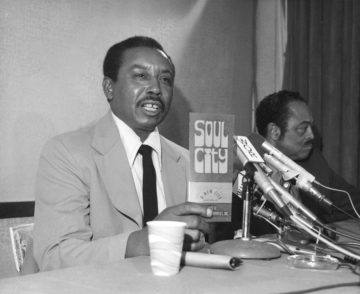Chris Lebron in The New York Times:
 Stop me if you’ve heard this one: A Black man walks into a federal government office and says, “Give me a lot of money and I’ll build you a Black city.” And the government, to everyone’s surprise, says, “OK, here’s $14 million!” No? Most people haven’t. The story of Floyd McKissick’s dream, struggle and, ultimately, failure to build an American city on behalf of Black citizens is one of the greatest least-told stories in American history. In “Soul City,” Thomas Healy chronicles this tragically quixotic enterprise by McKissick, a civil rights activist turned capitalist, who attempted, beginning in 1969, to build “Soul City,” a Black-run city on a former slave plantation in rural North Carolina, close to Southern Klan country.
Stop me if you’ve heard this one: A Black man walks into a federal government office and says, “Give me a lot of money and I’ll build you a Black city.” And the government, to everyone’s surprise, says, “OK, here’s $14 million!” No? Most people haven’t. The story of Floyd McKissick’s dream, struggle and, ultimately, failure to build an American city on behalf of Black citizens is one of the greatest least-told stories in American history. In “Soul City,” Thomas Healy chronicles this tragically quixotic enterprise by McKissick, a civil rights activist turned capitalist, who attempted, beginning in 1969, to build “Soul City,” a Black-run city on a former slave plantation in rural North Carolina, close to Southern Klan country.
McKissick was almost certain to fail the moment he purchased that 5,000-acre plantation in Warren County. So, with the ending obvious from the outset, the challenge for Healy is to recount the tale in such a way that our comprehension not only of McKissick’s attempt but of his inevitable defeat is deepened — to make the story of a Black American who dared to dream the biggest American dream while failing to realize it of value for our continued struggle with racial injustice today.
Floyd McKissick was a civil-rights-era legend. Raised in the South, he was intimately familiar with white supremacy. Healy reports that when McKissick was just 4 years old, he innocently resisted moving to the back of a trolley car, prompting the conductor to snarl at his aunt to come forward to get her “Black son of a bitch and take him back there with you.” From then on, Healy writes, McKissick was continually reminded that he was “a Black boy in a white land.” This incident, along with later racist encounters, including in 1951, when he integrated the University of North Carolina Law School, fueled his career as an activist. McKissick helped organize sit-ins in the wake of the 1960 Greensboro sit-in at Woolworth’s, an early example of nonviolent direct action, and went on to become a leader in the Congress of Racial Equality (CORE), which played a key role in the Freedom Rides through the South.
More here. (Throughout February, at least one post will be dedicated to honoring Black History Month. The theme this year is: The Family)
